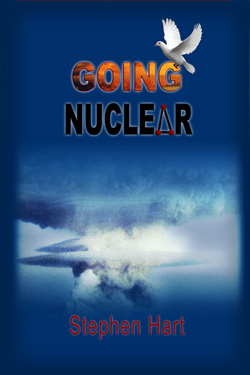Kirkus Book Review
In Hart’s debut historical thriller, a secret group hopes to build a nuclear bomb that will force the government into ending the Vietnam War.
Arthur Weiss is the son of an Army colonel, but he still has no itch to volunteer for Vietnam, especially after his older brother, Tom, returns from the war in a body bag. In fact, at the University of Illinois, he helps fellow student Joshua Taylor evade police at an anti-war demonstration on campus, an act that has unexpected consequences. Joshua turns up murdered, and FBI Agent Vic Torkis is on the case. The agent’s immediate supervisor, Frank Bono, wants to link the murder to a group Joshua was actively involved in, Students for a Democratic Society. Bono also assumes Joshua, who is black, belonged to the Black Panthers. Potential dissension between SDS and the Panthers, Bono believes, could aid in blaming Joshua’s death on the latter and discrediting the organization. Months later, Arthur, now a chemist at the University of Notre Dame Radiation Laboratory, is contacted by Billie Lee, a woman who claims to have been friends with Joshua in Illinois. Due to her association with the late student, Vic’s keeping an eye on her—and soon watching Arthur as well. Billie Lee tells Arthur she belongs to a “very select group,” separate from SDS, with plans to build a nuclear bomb as a means to negotiate with the government to end the war. Arthur can use his skills (and lab) to convert uranium to plutonium, but before long, he has doubts regarding the group’s true motivation.
Hart’s entertaining tale often plays like a soap opera. Vic is sure his wife, Cathy, is having an affair. He starts a pseudo-romance with Susie-Q, who works at a massage parlor, and is shocked when his daughter, Denise, wants to drop out of college. Arthur balances relationships with both Billie Lee and Donna Will, whom he meets at a student bar. Billie Lee is a sexually enticing, radical protestor, while Arthur sees himself settling down with Donna, who believes in ending the war peacefully. Nevertheless, Arthur’s dalliances render him less likable; seeing both women involves deceit, and Arthur shows no sign of remorse. There’s heavy political discourse throughout, and these extensive discussions consider various aspects of a nation at war, from racism in draft exemptions to the reason for the Vietnam War (imperialism, someone suggests). The narrative leaves little room for action, so while it’s abundantly clear that at least one individual remains in peril in the final act, the ending is a bit anticlimactic. Fortunately, Hart sprinkles in some humor: Arthur, having dropped acid (it’s the’60s, after all), hallucinates that President Richard Nixon is in his apartment, explaining why he won’t pull troops from Vietnam and making soup in a giant cauldron.
Characters debate more than act, but the novel astutely examines the Vietnam War.
GOING NUCLEAR Stephen Hart and Stephen Hart Aventine Press (278 pp.) $16.93 paperback, $7.99 e-book, $16.93 paperback, $7.99 e-book ISBN: 978-1-59330-688-5; September 18, 2017



